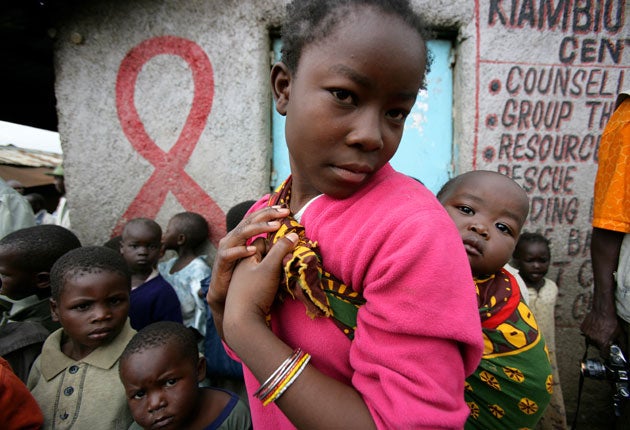An alternative for Kenya's HIV patients – or a health scandal?
A chain of UK-funded clinics is promoting an unproven homeopathic treatment

Your support helps us to tell the story
From reproductive rights to climate change to Big Tech, The Independent is on the ground when the story is developing. Whether it's investigating the financials of Elon Musk's pro-Trump PAC or producing our latest documentary, 'The A Word', which shines a light on the American women fighting for reproductive rights, we know how important it is to parse out the facts from the messaging.
At such a critical moment in US history, we need reporters on the ground. Your donation allows us to keep sending journalists to speak to both sides of the story.
The Independent is trusted by Americans across the entire political spectrum. And unlike many other quality news outlets, we choose not to lock Americans out of our reporting and analysis with paywalls. We believe quality journalism should be available to everyone, paid for by those who can afford it.
Your support makes all the difference.UK charities are funding an NGO that is advising HIV-positive patients in Kenya to use unproven homeopathy remedies to treat their disease.
A journalist working for the Kenyan Standard newspaper found that a practitioner working for the Abha Light Foundation (ALF), which runs a chain of clinics in Kenya, told one relative of a potential patient that they might not need to take antiretroviral (ARV) drugs once they had started on a course of homeopathic medicines.
Research by the Bureau of Investigative Journalism for The Independent can reveal that in the past five years the ALF has received thousands of pounds from UK donors and the Global Fund, the multinational foundation for HIV, malaria and TB part-funded by Bill Gates. The donations provided by the Global Fund do not directly fund homeopathic treatment.
An estimated 1.3 million people in Kenya are living with HIV in Kenya, and about 400,000 take ARVs. Abha Light, which was founded by a US citizen, Barbara Lynne –also known as Didi Ananda Ruchira – arrived in Kenya in 1998, when homeopathy was almost unknown there. It runs the country's largest homeopathic pharmacy and a college of natural medicine and homeopathy, as well as 20 health centres and 25 mobile clinics.
Homeopathy is based on the idea that "like cures like" and claims to use highly diluted substances to trigger the body to heal itself. The World Health Organisation (WHO) says there is no scientific evidence they are effective against HIV infection. But the ALF website says it uses homeopathic medicine as "the primary therapy" to boost patients' auto-immune responses, so the "high cost of conventional HIV/AIDS treatment is circumvented through alternative means".
Their site mentions the case of a 27-year-old man with "third-stage HIV", who had been advised to take ARVs but had doubts because of the side effects. "We put him on homeopathic treatment and advised him for naturopathic and nutritional interventive therapy ... within 10 days most symptoms receded," the site says.
The bureau also found that Ms Lynne told a fellow US homeopath by email that she had treated about 75 HIV patients with a homeopathic remedy known as Iquilai, while her colleagues treated some 300 more. "Iquilai will still work with those on ART [anti-retroviral therapy] but is not as effective, since ARTs interfere with the effectiveness of homeopathic medicines," she wrote.
To find out what the ALF was telling its patients, a reporter went undercover to one of its clinics in Kariobangi, a poor area of Nairobi, in January. He asked for information on behalf of a purported HIV-positive sister and recorded the conversation. Homeopath Rachael Rawi told him his sister may not need her ARVs once she had taken the homeopathic medicines.
In a statement, Abha said: "ALF abides by the ethical rules of healthcare practice outlined by the Ministry of Health, which includes what advice we give our clients ... ALF as an organisation, Didi Ruchira and Rachael Rawi personally, follow the ethical policy that they cannot advise and do not advise on the use of any medication that are prescribed by medical doctors."
In earlier correspondence, Ms Lynne said: "The Abha Light Foundation does not encourage or instruct patients to leave their ARVs. However, if a patient says they don't want to take ARVs, then we advise them of nutritional and homeopathic alternatives."
Craig McClure, acting co-ordinator of the treatment programme in the WHO's HIV department, said: "There is no evidence that homeopathy is an effective treatment for HIV infection. It should certainly not be considered as an alternative to antiretroviral drugs."
UK donors to the ALF include the Sheaf Trust, the Tanner Trust and the Samuel Storey Family Charitable Trust. The ALF has also received more than US$10,000 (£6,000) from Care International in Kenya, which is funded by the Global Fund. A Global Fund spokeswoman said: "There are no homeopathy activities funded from the Global Fund grant." The other charities declined to comment, apart from the Sheaf Trust which said that concerns about the ALF's activities are best addressed to the foundation.
Melanie Newman is a journalist with the Bureau for Investigative Journalism, a not-for-profit organisation based at City University
Join our commenting forum
Join thought-provoking conversations, follow other Independent readers and see their replies
Comments